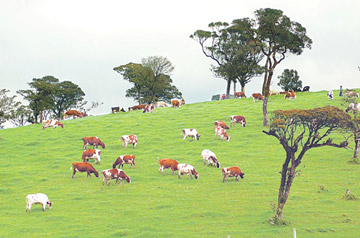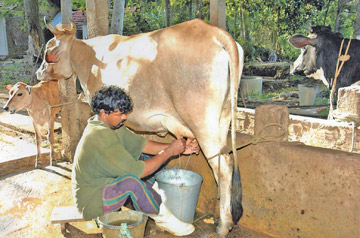|
Govt assistance welcome:
Dairy industry, a boost to plantation workers
By P. Krishnaswamy
After the Government's recent decision to empower MILCO to purchase
all the milk produced by farmers as part of its strategy to achieve
self-sufficiency in milk by 2016, and the subsequent media conferences
conducted by the Ministry of Livestock and Rural Community Development
on the subject, the Sunday Observer visited some of the plantation areas
around Hatton, the hub of the tea export industry, where plantation
workers, some private entrepreneurs and even plantation managements are
engaged in dairy farming. The visit was to observe the progress in the
dairy farming industry, fodder development strategies, problems and
shortcomings encountered by the farmers and remedial measures deemed
necessary for achieving the Government's goal.
 A
good percentage of estate workers is engaged in small time dairy farming
to supplement their income. A majority of them are Hindus and
traditionally too are inclined towards rearing cows. The availability of
lush grasslands and the right climatic conditions provide a favourable
atmosphere for their dairy farming endeavours. A
good percentage of estate workers is engaged in small time dairy farming
to supplement their income. A majority of them are Hindus and
traditionally too are inclined towards rearing cows. The availability of
lush grasslands and the right climatic conditions provide a favourable
atmosphere for their dairy farming endeavours.
While the dairy industry has the potential to contribute considerably
towards the economic development of the nation, it has contributed to
the economic well-being of plantation workers too.
Our first visit was to Kotagala, a small plantation town 10 km off
Hatton on the Nuwara Eliya road where one of MILCO's largest milk
collecting centres is located. The Nuwara Eliya district has the highest
average daily production of milk per head and Kotagala is a hub of dairy
farming.
We met 10 small time dairy farmers in the surrounding estates,
including Drayton, Rothschild and Wooten. The early morning hours when
we undertook to meet the farmers in their cattle sheds were cold since
the rains had just begun after the months-long drought.
Pattan Rajagopal (59) of KO Division, Drayton Estate was in his
cattle shed, having gone there at 5.00 in the morning, braving the cold
weather. The estate is about three km from the town. The cattle shed was
narrow and in a dilapidated condition; his three cows were crammed in
there. Rajagopal has to clean the shed and wash his cows every morning
before milking them and dispatching the milk to the MILCO collecting
centre at Kotagala. Finishing this task at 7.00am, he rushes to the
estate to be assigned his day's labour.
Full time dairy farmer
Rajagopal's wife Jothiammah (48) does not work on the estate and is
occupied full time in dairy farming, he said. He is happy that he gets
an average of Rs. 47 per litre from MILCO whereas he earned only about
Rs. 28 before the MILCO collecting centre was established.
Appavu Loganathan (63) of KO Division, Drayton Estate said he and his
wife Selliah Amarawathy (55) are both employed on the estate while also
doing dairy farming. Their two sons aged 27 and 23 have studied up to
the GCE (O/L) and are not employed on the estate. They own two milch
cows. Their old cattle shed is on the verge of collapse and needs
immediate renovation.
 Palaniyandy
Devadas (56) of Wooten Estate said he has one milch cow which gives a
daily average of 21 litres of milk. He and his wife Sathiadevi (44) are
employed on the estate while their two sons aged 21 and 18 are still
studying. Palaniyandy
Devadas (56) of Wooten Estate said he has one milch cow which gives a
daily average of 21 litres of milk. He and his wife Sathiadevi (44) are
employed on the estate while their two sons aged 21 and 18 are still
studying.
Subramaniam Palaniyandy (58) of Rothschild Estate said he and his
wife Valliyammal (50) work on the estate and also rear two cows, of
which one is pregnant now. His son works in Colombo after passing his
GCE (O/L).
Palaniyandy Selvaratnam (45) of Drayton Estate said his family has
two cows and one is pregnant. He and his wife Sagunthaladevi (39) work
on the estate while also doing dairy farming. His children, a girl and
three boys, attend school, he said.
Independence, additional income
All farmers said in spite of certain shortcomings, they liked their
profession because it gave them a degree of independence while also
supplementing their income. They have been able to meet the educational
expenses of their children and renovate their houses with the extra
income from dairy farming.
These families take some of the milk for their daily domestic
consumption while also supplying some to their neighbours, which
contributes to their nutritional standard as well. They would be able to
rear four to five cows if the authorities took steps to address the
difficulty in finding fodder. Many farmers said they have no access to
grasslands in the estates due to the rigid attitude of the estate
managements. There are unused lands where they can grow grass to feed
their cattle, but this facility is denied to them. They have to walk
between three and four km to cut grass.
Earlier, every dairy farmer family had between three and five cows,
but some had been sold later because of the growing fodder problem. Due
to the difficulty in finding grass, they feed their cows with poonac
cake and rice bran which are comparatively expensive. Providing the
minimum 30 litre daily requirement of drinking water to the cattle is
also a problem due to non-availability of clean water close to the
cattle sheds, the farmers said. There are large ponds collecting stream
water in the valleys within the estates, but they are not close.
The Ministry of Livestock Development or other authorities should
provide facilities to construct storage tanks nearer the cattle sheds
and to have the water from the ponds pumped or drained to the tanks,
they said. The farmers said their cattle sheds were constructed many
decades ago and need repairs, but the building material supplied by the
Ministry of Livestock Development through the local veterinary offices
had reached only a small percentage of the farmers.
No levy from farmers
Regional Manager of the MILCO Collecting Centre at Kotagala P.
Chandrasekaran told the Sunday Observer that 450 farmers supply about
3,000 litres of milk to the centre on a daily basis. The centre hires
three vehicles to collect milk from the farmers, incurring a monthly
expenditure of Rs. 100,000, but do not levy any charges from the
farmers, he said.
The Nuwara Eliya region has over 3,000 farmers supplying an average
of 22,000 litres per day to MILCO collecting centres in Kotagala,
Punduloya, Holbrook, Ragalla, Norwood, Gampola and Nawalapitiya, he
said. The farmers are members of 243 Farmer Management Societies which
represent their interests with regard to the industry. They supply
veterinary drugs to the farmers at subsidised rates. Building material
to the value of Rs. 30,000 are supplied to members of these societies
for the renovation of their cattle sheds. The material supplied by the
Ministry of Livestock Development is distributed among deserving farmers
through the nearest government veterinary centres in a phased manner,
Chandrasekaran said.
A majority of the farmers engaged in dairy farming in the estates do
not own grasslands and, in the case of farmers who own lands, the MILCO
supplies grass cutting facilities for developing grasslands, he said. |

